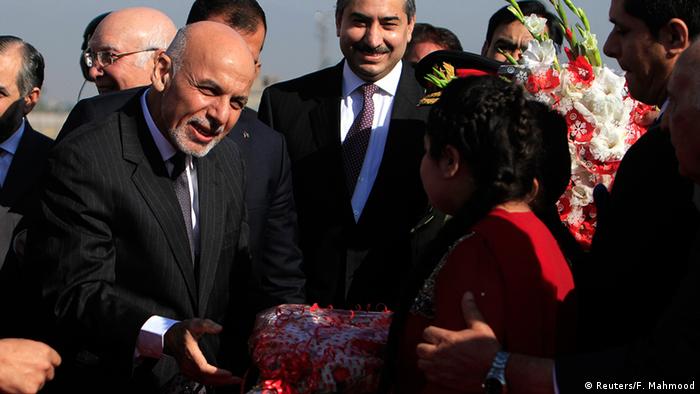 Afghan President Ashraf Ghani is in Pakistan to improve ties with the neighboring Islamic country. But analyst Siegfried O. Wolf tells DW that Islamabad's regional interests will continue to be a stumbling block.
Afghan President Ashraf Ghani is in Pakistan to improve ties with the neighboring Islamic country. But analyst Siegfried O. Wolf tells DW that Islamabad's regional interests will continue to be a stumbling block.
Afghan President Ashraf Ghani arrived in Islamabad on Friday, November 14, on his first official visit after coming to power in September. One of Ghani's tasks is to improve bilateral relations with the South Asian nuclear power which have been tense for many years.
Ghani's predecessor Hamid Karzai was openly critical of Islamabad's alleged lack of cooperation in countering the militant Islamist groups which have been launching violent attacks on the international and local security forces in the region for more than a decade. As the NATO-led international troops are withdrawing from the war-torn country, the future of Afghanistan looks more uncertain than ever. In this regard, Islamabad's cooperation with the new regime in Kabul is crucial for the stability Afghanistan.
Siegfried O. Wolf, a senior research fellow and lecturer in International and Comparative Politics at the University of Heidelberg's South Asia Institute, says in a DW interview that President Ghani can outline a roadmap for new Afghan-Pakistan relations but for that he will need the support of the Pakistani security establishment.
DW: Can President Ghani's Pakistan tour be a prelude to new and improved Afghanistan-Pakistan ties?
Siegfried O. Wolf: It depends on many factors. Over the decades, Pakistan's Afghan policy has not only been influenced by external factors, domestic considerations also play a big role. Afghanistan is an important country for Pakistan, whether there is a weak civilian government in Islamabad or a powerful military regime. The previous Afghan administration of Hamid Karzai did not have good relations with Pakistan, but President Ghani can outline a roadmap for new Afghan-Pakistan ties after the withdrawal of most foreign combat troops from his country.
Having said that, I think it will not be easy for both Ghani and the Pakistani leadership to resolve core issues. Nevertheless, the most important thing at the moment is to resume talks.
Why is it difficult to resolve the core issues?
Despite the fact that both countries share many aspects in the areas of culture, religion and civilization, their bilateral relations have always been antagonistic for a number of historical reasons. Although there have been some improvements in ties over the years, these positive developments have not proven to be sustainable enough to substantially change the attitudes of the two countries towards each other. Deep mistrust, suspicion, resentment and bitterness between Kabul and Islamabad have caused this political deadlock.
It is surprising because Pakistan says that it wants a unified, peaceful and friendly Afghanistan. But Pakistan's strategic interests and regional policies always contradicted its claims. Instead of cooperating with each other, the two neighbors have been interfering in each others' internal affairs, thus hampering social, economic and political development of the region.
Afghanistan's main accusation is that Pakistan is supporting militant groups to destabilize its government, whereas Islamabad accuses Kabul of aiding insurgents in its resource-rich western Balochistan province. These suspicions are unlikely to go away soon because the Pakistani security establishment is convinced that Kabul wants to keep close ties with New Delhi.
Are Pakistani Prime Minister Nawaz Sharif and his country's military leadership on the same page over Afghan policy?
It seems that PM Sharif has no clear policy on Afghanistan. And as far as Pakistan's Afghanistan policy is concerned, I don't see any conflict between the civilian and military leaders. Actually, it is one of the few areas where the Islamic country's politicians and generals are usually on the same page.
Is Ghani assuming a tougher stance against the Taliban than his predecessor Karzai? And is Pakistan going to cooperate with the new Afghan administration in this regard?
President Ghani will not have much room to implement a stricter policy against the Taliban and other Islamist groups. Apart from financial constraints, much depends on how Ghani manages his country's military, ensures civilian dominance, and continues to receive US backing.
In this context, the rise of the Sunni militant group "Islamic State" (IS) in Iraq and Syria, and its expanding influence in the Afghanistan-Pakistan region, might force Washington to keep close ties with the regime in Kabul. From the Pakistani side, much depends on the Pakistani army's willingness to fight terrorism. As long as Pakistan believes that certain militant groups can be used to achieve domestic and regional goals, the cooperation with Afghanistan will remain a dream.
Since the international troops are in the final phase of withdrawing from Afghanistan, how do you see Islamabad's role in the region in the coming months?
Until now Pakistan's security establishment has opposed the idea of India or any other country filling the power vacuum in Afghanistan. It seems that these security paradigms remain unchanged. Islamabad's future actions, therefore, might not be much different from what we have seen in the past.
Siegfried O. Wolf is a senior research fellow and lecturer in International and Comparative Politics at the University of Heidelberg's South Asia Institute.
Afghan President Ashraf Ghani is in Pakistan to improve ties with the neighboring Islamic country. But analyst Siegfried O. Wolf tells DW that Islamabad's regional interests will continue to be a stumbling block.


No comments:
Post a Comment